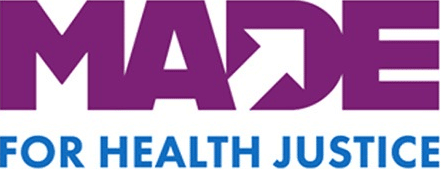Frequently Asked Questions
Modernized Anti-Racist Data Ecosystems (MADE) for Health Justice is an initiative accelerating the development of health-focused local data ecosystems that center principles of anti-racism, equity, justice, and community power.
Through MADE for Health Justice, non-profit organizations are funded to build and facilitate multi-sector teams tasked with creating local data ecosystems. These ecosystems must focus on improving community health, connecting data across local government sectors, and prioritizing the needs and voices of communities oppressed by structural racism to ultimately drive just and equity-centered decision-making.
Inspired by the Robert Wood Johnson Foundation (RWJF)’s National Commission to Transform Public Health Data Systems, MADE for Health Justice is supported through a partnership between RWJF and the de Beaumont Foundation.
The goal of MADE for Health Justice is to accelerate the development of health-focused local data ecosystems that center principles of anti-racism, equity, justice, and community power. Ultimately, the initiative seeks to identify pathways for creating local data ecosystems that intentionally and sustainably:
- Connect data across local government sectors to advance a health equity goal.
- Use and formalize collaborative governance structures and community power building approaches that prioritize the needs of communities oppressed by structural racism.
- Change and improve routine data operations, processes, and structures to build trust and accountability.
- Center principles of anti-racism, equity, and justice.
As part of MADE for Health Justice, teams will:
- Pursue a health equity goal that can be advanced with multi-sector, local data that reflects assets and needs within communities of color and drives upstream changes in power, access, and opportunity.
- Confront organizational and community-level structural barriers to achieving the health equity goal.
- Connect and use available data sources across sectors to investigate and validate structural barriers that inhibit progress toward the health equity goal.
- Establish and formalize collaborative governance processes. The goals of these processes are to reveal and change existing power structures, build trust and accountability, and ensure that communities of color are full and formal partners in decision-making across the data life cycle.
- Make substantial changes to routine data operations and processes within and across local government. Ultimately, changes to these operations and processes should help local data ecosystems routinely generate information for decision-making that centers the voices, experiences, and needs of communities of color.
- Engage in learning and training opportunities. Teams will continually participate in learning and training opportunities that will inform their efforts to create local data ecosystems that center anti-racism, equity, justice, and community power.
- Obtain ongoing technical assistance throughout the three-year grant period from the MADE National Office.
As part of MADE for Health Justice, teams will obtain ongoing technical assistance throughout the three-year grant period from the MADE National Office.
Grant activities will span three years. Activities began in August 2023 and end in July 2026.


 What is MADE for Health Justice?
What is MADE for Health Justice?